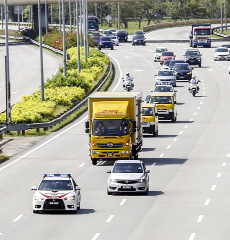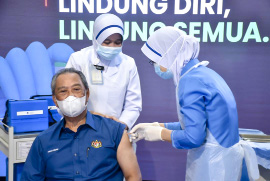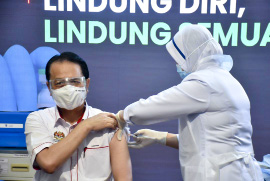National Covid-19 Immunisation Programme kicks off with 637,000 individuals registering for the free vaccine on the first day
The nation’s most extensive vaccination programme received a boost when Prime Minister Tan Sri Muhyiddin Yassin received the first dose on his left arm on Feb 24.
The Prime Minister was injected with the first of two doses of the Pfizer-BioNTech Covid-19 vaccine at the Putrajaya District Health Office Precinct 11, administered by Putrajaya health clinic Chief Nurse Lina Ibrahim.
Also receiving their first doses were Health Director-General Tan Sri Dr Noor Hisham Abdullah (pix top right) along with a group of frontliners from the healthcare sector, namely, Clement Marai Francis, a driver with the Putrajaya district health clinic, Medical Officer Dr Tan Yee Ling, nurse Sheilla Melissa Sikin from Precinct 9 health clinic and Assistant Medical Officer Dr Khairul Asraf Mohd Yassin from the Ministry of Health (MoH)
The inoculation was telecast live at 2.30pm to encourage Malaysians to get vaccinated. There have been reports of some adverse side-effects of the vaccine in other countries, and the government is concerned this could affect the acceptance rate locally.
Logistics of vaccines procured
The government has allocated RM2.05 billion to purchase the Covid-19 vaccines, covering 26.5 million Malaysians who will get free vaccination (82.8 per cent of Malaysians). Non-citizens residing in Malaysia will also enjoy free immunisation.
The Covid-19 Vaccine Supply Access Guarantee Special Committee (JKJAV), co-chaired by Health Minister Datuk Seri Dr Adham Baba and Science, Technology and Innovation Minister Khairy Jamaluddin, is in charge of the Covid-19 vaccine acquisition, distribution and immunisation framework and plan.
Malaysia has secured procurement of 66.7 million doses of the vaccine through the COVAX Facility from five producers. These vaccines are Pfizer-BioNTech, AstraZeneca, Sinovac, CanSinoBIO and Sputnik V.
On Feb 16, Muhyiddin launched the NIP guidebook, obtained from JKJAV’s official website at https://www.vaksincovid.gov.my/.
According to the NIP guidebook, vaccine delivery and storage involves the integrated operation of multi-government agencies through the MoH, the Malaysian Armed Forces (ATM) and other security authorities.
And as a precautionary measure, before the immunisation process is carried out, the MoH carried out a vaccine dry run from the Pfizer factory in Belgium to Klinik Kesihatan Belaga in rural Sarawak and Bintulu Hospital on Jan 29-30, 2021.

The convoy was escorted by cops.
The first shipment of 312,390 doses of Pfizer-BioNTech vaccine arrived on Sunday, Feb 21, via air. Dr Adham, Khairy, Transport Minister Datuk Seri Dr Wee Ka Siong and Dr Noor Hisham were present at the KL International Airport (KLIA) in Sepang to receive the two-unit load devices (ULD) of the vaccines. They stayed till the shipment was transported away for storage.
The ULD from the aircraft’s cargo section was loaded into a truck belonging to logistics company DHL at the Advanced Cargo Centre (ACC). Part of the first batch was also transported overland from Singapore to Johor, arriving in Senai at 2.45pm.
This first batch of vaccine was transported under heavy police escort to 16 DHL storage centres, six of them in Selangor, four in Johor, three in Kuala Lumpur, two in Penang and one in Putrajaya.
The vaccines will be stored in Vaccines Storage Centres (VSCs) in 54 locations.
Timeline for Malaysia’s vaccine acquisition

National vaccination plan
The NIP will be carried out in three phases, each targeting different priority groups, and will be done free of charge.
The first phase from February to April targets frontliners from the public and private healthcare personnel and essential services such as defence and security personnel.
The second phase will be from April to August, targeting senior citizens aged 60 and above and vulnerable groups with morbidities and people with disabilities, while the third phase is from May to Feb 2022 for those aged 18 and above.
As the clinical trials were not conducted on children, the government exempts children from the NIP. It will only consider using the Covid-19 vaccine in children when there is scientific data that proves its effectiveness and safety to them.
During the NIP guidebook launching event, Muhyiddin stated that although the government had not made it compulsory for people to get vaccinated, those who refuse inoculation could face restraints in moving around or engaging in businesses in the future.
At the same event, Khairy said the Covid-19 vaccine would be administered to security personnel and volunteers at the vaccination centres if people who registered for the vaccine do not turn up as the vaccine’s life span is very short once removed from cold storage.
The government aims for at least 80 per cent of Malaysia’s adult population to be vaccinated by February 2022 to reduce this virus’s spread.
There are plans to open 605 Vaccines Administration Centres (VACs) across the country involving public and private health facilities, stadiums, convention centres, public halls and universities.
Muhyiddin also launched the Covid-19 vaccination registration programme through the MySejahtera application to facilitate the immunisation programme’s implementation.
It was reported that within the first day, 637,000 individuals registered through the MySejahtera app.
Alternatively, the public can register via the website ‘www.vaksincovid.gov.my’, or for offline registration, they may contact the hotline announced soon; head to the nearest public or private healthcare facility; or through assistance programmes for residents in rural and inland areas. — The Health









